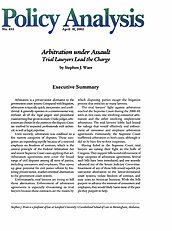Arbitration is a private-sector alternative to the government court system. Compared with litigation, arbitration is typically quick, inexpensive, and confidential. It generally operates in a commonsense way, without all of the legal jargon and procedural maneuvering that go on in court. Unlike judges, arbitrators are chosen by the parties to the dispute. Cases are resolved by respected professionals with technical, as well as legal, expertise.
Until recently, arbitration was confined to a few narrow categories of disputes. Those categories are expanding rapidly because of a renewed emphasis on freedom of contract, which is the central principle of the Federal Arbitration Act and recent Supreme Court cases applying that act. Arbitration agreements now cover the broad range of civil disputes among all sorts of parties, including consumers and employees. That opens up great potential for civil justice reform by fostering private-sector, market-oriented alternatives to the government court system.
Unfortunately, trial lawyers are trying to kill those alternatives. Enforcement of arbitration agreements is especially threatening to trial lawyers because those contracts are the means by which disputing parties escape the litigation process that enriches so many lawyers.
The trial lawyers’ fight against arbitration reached the Supreme Court during the 200001 term in two cases, one involving consumer arbitration and the other involving employment arbitration. The trial lawyers’ lobby had hoped for rulings that would effectively end enforcement of consumer and employee arbitration agreements. Fortunately, the Supreme Court reaffirmed arbitration in both cases, although it did so by bare five-to-four majorities.
Having failed in the Supreme Court, trial lawyers are taking their fight to the halls of Congress. They support bills to end enforcement of large categories of arbitration agreements. Several such bills have been introduced, and one recently advanced out of the Senate Judiciary Committee. Enactment of any of those bills would squelch private-sector alternatives to the lawyer-dominated court systems, violate freedom of contract, and raise costs to American business. While the bills purport to advance the interests of consumers and employees, they would likely harm most of the people they purport to help.
About the Author

This work is licensed under a Creative Commons Attribution-NonCommercial-ShareAlike 4.0 International License.
